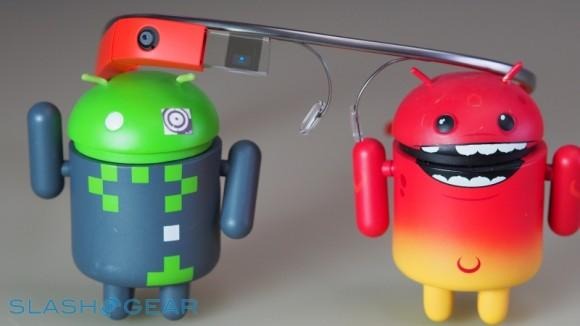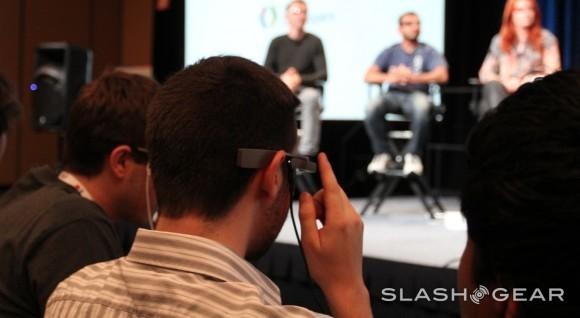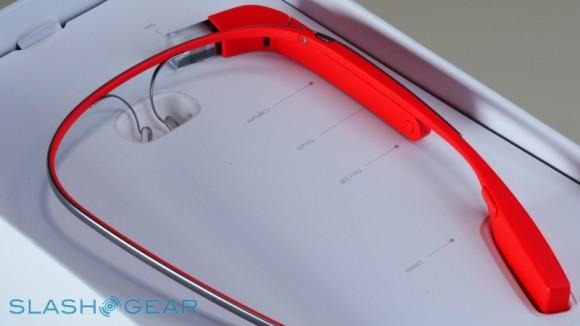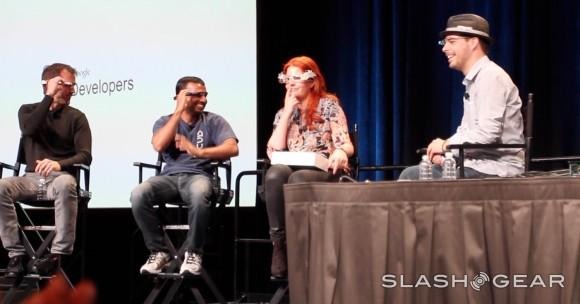Google Glass Creators Talk "Staring" And The Social Implications Of Wearables
As Google Glass continues to be a unique sort of hardware / software platform in the industry, so too do the creators of the wearable computer stay hot commodities for question and answer sessions. In the feature you're about to see, two members of the main Glass creation and development team discuss the social etiquette involved in the creation of the platform. Steve Lee, Product Director for Glass, and Charles Mendis, Engineer on Glass, spoke up during a fireside chat at Google I/O 2013.
As we saw a relatively large amount of users working with Glass at this year's Google developers convention, it only made sense that sessions featuring the team that made the device would be rather popular. Every single one of the chats surrounding Glass were packed to the brim with developers, press, and the like. Steve Lee let it be known how the device began its life as a wearable.
Steve Lee: I've been on the project since the beginning, so almost 3 years now. So I have a pretty good view of how the product has evolved and what the team philosophy has been. And I can definitely say that from the beginning, the social implications and social etiquette of Glass, of people wearing Glass, has been at the top of our mind in how we design and develop the product.
And not only thinking about the people who will buy and use Glass, be wearing Glass, but really everyone. And the social implications for those around the people wearing Glass.
So I'm proud of the team for taking it seriously and thinking about that early on.

Lee: Lemme just give a few examples of how the design has evolved to accommodate some of that:
One is that the display is up above the person's eye. We learned that very early on – some of our very early prototypes actually covered your eyes. We soon discovered how important human eye contact is with people around you.

Lee: Another common question is about distractions – is Glass distracting? How do I know if you're paying attention to me? Typically people who are asking that haven't been around someone with Glass yet. Because once you're around someone with Glass, you'll know that they're paying attention to you. Because they're looking at you – you have eye contact.
And if you're looking at Glass, you're looking up at the display.
So that's one example of design.

Lee: A second thing is with the camera. A lot of the privacy questions are around the camera and picture-taking and videos. That's why to start recording a video, or to take a picture, the way you do it has clear social cues – a social gesture.
There's a camera button right here – so I have to raise my hand, press the button to take a picture. Or speak to Glass, and say "OK Glass, take a picture. Or OK Glass, record a video." So it's a clear cue to people around you.
The third example that I like to give is – and I want to really educate people about this about how Glass works – is that when Glass is active, the display lights up. It lights up not only for me to see, but for other observers to see that as well.
So right now you can't see a light emitting from Glass because it's not active. So because of that, you can rest assured that I'm not recording you right now.
Q: Well it could be hacked, right?
Lee: Yes, that's on Charles.
We take the trust and reliability of our software very seriously, like all other teams at Google. So by design, that's not intended. Our design is to ensure that the display is active when Glass is active.
And that'll be part of our SDK – our GDK – it'll also be part of our policy. So applications won't be permitted that don't do that.

Charles Mendis: Just to add to that, on the social cues – if I'm recording a video of you with Glass, I have to be staring at you. If I want to be recording you, I have to stare at you. And as a human being, if someone is staring at you, you kind of notice.
Like a girl's walking down the street, and a guy's just like. *STARE*
So I definitely think there's going to be social cues. And again, like in the restroom. If you walk into the restroom, even without Glass, and somebody is just looking at you... I don't know about you, but I'm going to get the heck out of there.
